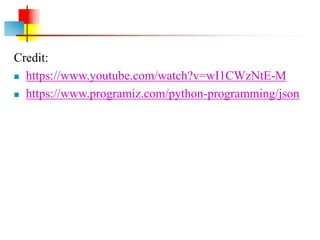JSON(JavaScript Object Notation) Presentation transcript
- 2. Outline ? What is JSON? ? Syntax ? Example ? Schema ? Validating JSON file ? Using JSON with Python ? Writing a JSON file ? Reading a JSON ? Accessing JSON Properties in Python
- 3. What is JSON? ? “JSON” stands for “JavaScript Object Notation” ? Lightweight data-interchange format ? Despite the name, JSON is a (mostly) language- independent way of specifying objects as name-value pairs ? Structured representation of data object ? Can be parsed with most modern languages ? JSON Schema can be used to validated a JSON file
- 4. JSON Syntax Rules ? JSON is almost identical to python dictionary except for ? In JSON, true and false are not capitalized ? In JSON, null is used instead of None ? Uses key/value pairs: {“name”: “John”} ? Uses double quotes around KEY and VALUE ? Must use the specified types ? File type is “.json” ? A value can be: A string, a number, true, false, null, an object, or an array ? Strings are enclosed in double quotes, and can contain the usual assortment of escaped characters
- 5. JSON Example { "name": "John Smith", "age": 35, "address": { "street": "5 main St.", "city": "Austin" }, "children": ["Mary", "Abel"] }
- 6. JSON Schema ? A JSON Schema allows you to specify what type of data can go into your JSON files. ? It allows you to restrict the type of data entered.
- 7. JSON Schema { "type": "object", "properties": { "name": { "type": "string" }, "age": { "type": "integer" }, "address": { "type": "object", "properties": { "street": { "type": "string" }, "city": { "type": "string" } } "children": { "type": "array", "items": { "type": "string } } } }
- 8. Validating JSON file ? The following website can be used to validate a JSON file against a schema https://www.jsonschemavalidator.net/ ? Paste both the schema and the corresponding JSON file
- 9. Using JSON with Python ? To work with JSON (string, or file containing JSON object), you can use Python's json module. import json
- 10. Loading JSON data from a file ? Example: def load_json(filename): with open(filename) as file: jsn = json.load(file) #file.close() return jsn person = load_json('person.json') ? This command parse the above person.json using json.load() method from the json module. The result is a Python dictionary.
- 11. Writing JSON object to a file ? Example: person = { "name": "John Smith", "age": 35, "address": {"street": "5 main St.", "city": "Austin"}, "children": ["Mary", "Abel"]} with open('person_to_json.json', 'w') as fp: json.dump(person, fp, indent=4) ? Using json.dump(), we can convert Python Objects to JSON file.
- 12. Accessing JSON Properties in Python ? Example: Assume that you already loaded your person.json as follows. person = load_json('person.json') To access the property "name" ? Print(person["name"]) ? John Smith
- 13. Accessing JSON Properties in Python ? Example: Assume that you already loaded your person.json as follows. person = load_json('person.json') To access the property “age" ? person["age"] ? 35
- 14. Accessing JSON Properties in Python ? Example: Assume that you already loaded your person.json as follows. person = load_json('person.json') To access the property “street" ? print(person["address"]["street"]) ? 5 main St.
- 15. Accessing JSON Properties in Python ? Example: Assume that you already loaded your person.json as follows. person = load_json('person.json') To access the property “street" ? print(person["address"]["city"]) ? Austin
- 16. Accessing JSON Properties in Python ? Example: Assume that you already loaded your person.json as follows. person = load_json('person.json') To access the property “street" ? print(person["children"][0]) ? Mary
- 17. Accessing JSON Properties in Python ? Example: Assume that you already loaded your person.json as follows. person = load_json('person.json') To access the property “street" ? print(person["children"][1]) ? Abel
- 18. Python – JSON Objects

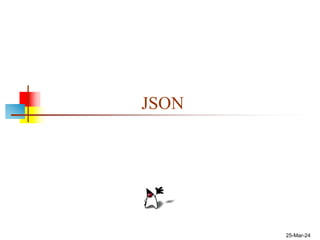
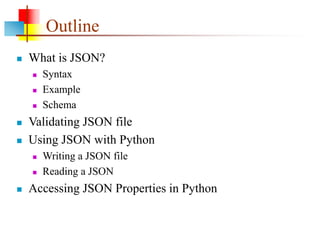
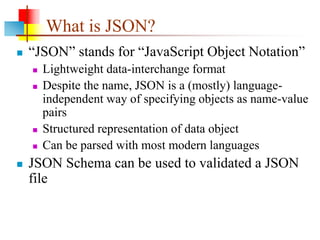
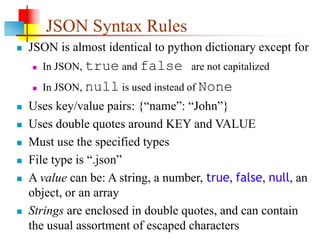
![JSON Example
{
"name": "John Smith",
"age": 35,
"address": {
"street": "5 main St.",
"city": "Austin"
},
"children": ["Mary", "Abel"]
}](https://image.slidesharecdn.com/json-240325130220-4f6099c7/85/JSON-JavaScript-Object-Notation-Presentation-transcript-5-320.jpg)
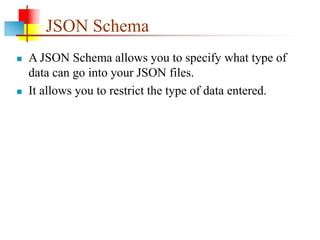


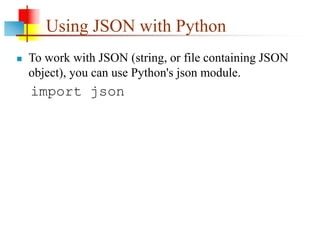
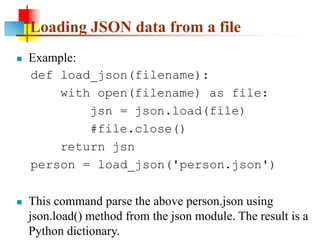
![Writing JSON object to a file
? Example:
person = { "name": "John Smith", "age": 35,
"address": {"street": "5 main St.", "city":
"Austin"}, "children": ["Mary", "Abel"]}
with open('person_to_json.json', 'w') as fp:
json.dump(person, fp, indent=4)
? Using json.dump(), we can convert Python Objects to
JSON file.](https://image.slidesharecdn.com/json-240325130220-4f6099c7/85/JSON-JavaScript-Object-Notation-Presentation-transcript-11-320.jpg)
![Accessing JSON Properties in Python
? Example:
Assume that you already loaded your person.json as
follows.
person = load_json('person.json')
To access the property "name"
? Print(person["name"])
? John Smith](https://image.slidesharecdn.com/json-240325130220-4f6099c7/85/JSON-JavaScript-Object-Notation-Presentation-transcript-12-320.jpg)
![Accessing JSON Properties in Python
? Example:
Assume that you already loaded your person.json as
follows.
person = load_json('person.json')
To access the property “age"
? person["age"]
? 35](https://image.slidesharecdn.com/json-240325130220-4f6099c7/85/JSON-JavaScript-Object-Notation-Presentation-transcript-13-320.jpg)
![Accessing JSON Properties in Python
? Example:
Assume that you already loaded your person.json as
follows.
person = load_json('person.json')
To access the property “street"
? print(person["address"]["street"])
? 5 main St.](https://image.slidesharecdn.com/json-240325130220-4f6099c7/85/JSON-JavaScript-Object-Notation-Presentation-transcript-14-320.jpg)
![Accessing JSON Properties in Python
? Example:
Assume that you already loaded your person.json as
follows.
person = load_json('person.json')
To access the property “street"
? print(person["address"]["city"])
? Austin](https://image.slidesharecdn.com/json-240325130220-4f6099c7/85/JSON-JavaScript-Object-Notation-Presentation-transcript-15-320.jpg)
![Accessing JSON Properties in Python
? Example:
Assume that you already loaded your person.json as
follows.
person = load_json('person.json')
To access the property “street"
? print(person["children"][0])
? Mary](https://image.slidesharecdn.com/json-240325130220-4f6099c7/85/JSON-JavaScript-Object-Notation-Presentation-transcript-16-320.jpg)
![Accessing JSON Properties in Python
? Example:
Assume that you already loaded your person.json as
follows.
person = load_json('person.json')
To access the property “street"
? print(person["children"][1])
? Abel](https://image.slidesharecdn.com/json-240325130220-4f6099c7/85/JSON-JavaScript-Object-Notation-Presentation-transcript-17-320.jpg)

